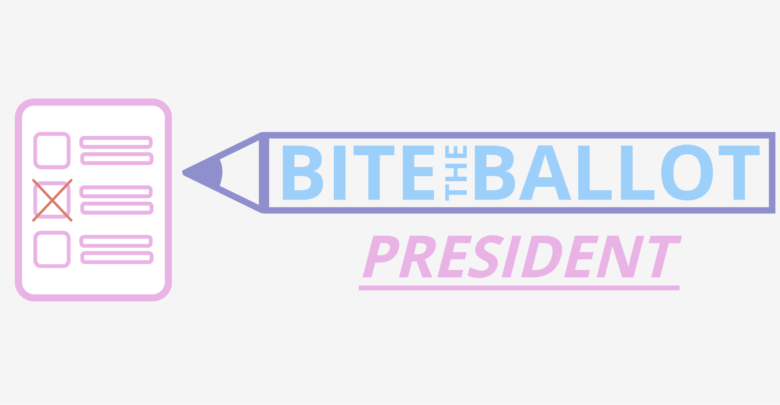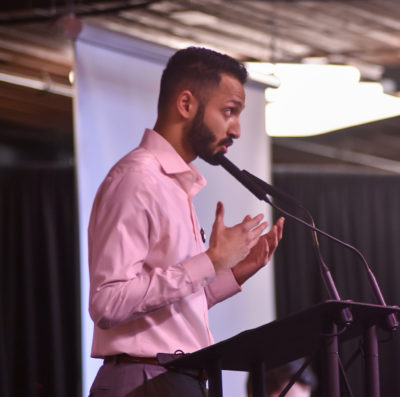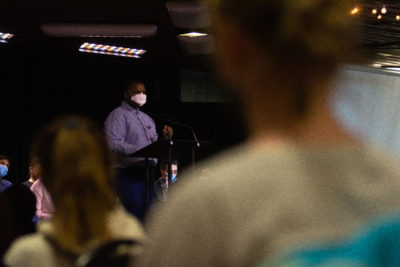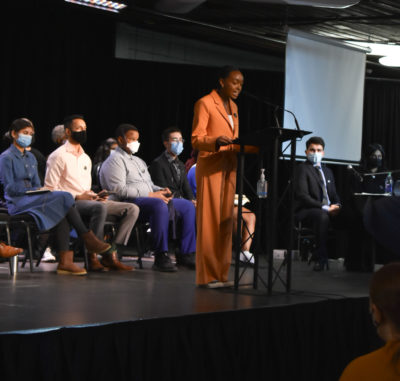 Lochlann Kerr
Lochlann KerrWhile last year’s presidential race was uncontested, this year is different in that students get to choose from three different candidates. While the candidates have similar platforms on many points, it is still nice to be presented with three choices for our next Students’ Union president — even if their platforms have been similar and underwhelming.

Abner Monteiro
Monteiro is the current vice-president (academic) (VPA) of the Students’ Union. As someone who was the VPA during this time of chaotic hybrid learning, I do think that Monteiro is in the best position to advocate for the reimagining of post-secondary education that many students and candidates are talking about.
Monteiro promises to implement hybrid learning technology in all campuses and work with the university to create a hybrid learning plan. He also says he will work towards removing the final exam requirements in courses, to encourage professors to explore other options. Lastly, he will work towards creating a syllabus bank which would allow students to view course syllabi before a course registration.
This is obviously a continuation of the work that Monteiro has done this year, like most presidential candidates who were previously an SU exec. However, in this case, the work that Monteiro has done this year has been quite substantive and I have faith he’d bring this to the presidential role to score big academic wins for students.
Something raised at the Myer Horowitz forum by candidate Emily Kimani was that Monteiro’s platform lacks any goals about environmental sustainability and climate change. Monteiro said that while that may be true, he focuses on other kinds of sustainability, like social and economic. While Monteiro’s answer was not very convincing, he was able to admit that he didn’t have environmental sustainability in his platform, but assure students that it was still an issue on his mind.
Monteiro’s strength is his diplomatic nature. He was able to respond to very pointed questions at all forums with relative ease and in a mild-mannered way. However, this can also be a weakness as I remain unconvinced Monteiro will be able to strongly stand up to administration or government on students’ behalf. In a presidential candidate I would like to see a more assertive stance taken and hear them talk about more direct action and protest.

Haruun Ali
Ali on the other hand, claims to be the total opposite type of candidate. He has done lots of previous work as an activist and a city councillor candidate during the last municipal election. Ali claims to be the “different candidate” and he certainly seems the most willing to mobilize students and stand up to the powers that be.
However, there are no substantive steps to achieve his goals behind this passion. While he makes lots of promises to “demand” things from the university and government, there is nothing behind this advocacy but talk. I had initially anticipated Ali to be the candidate to advocate for more radical action like sit-ins or tuition strikes and while I think Ali would be open to these ideas, he has not mentioned them or laid out any concrete steps for how he would get some of his advocacy wins done. His platform is vague, and isn’t as well thought out as I would have hoped.
Ali’s inexperience as someone who has only been on Students’ Council for one month also shows and I came away from several forums questioning if Ali understood some of the fundamentals in university governance as someone who is new to the Students’ Council. That is not to say that Ali could not learn these things and I am very sympathetic to the idea of non-executives running in these elections. Just not at the expense of a good platform based on good research.

Emily Kimani
While the president role is often filled by a former vice-president (external) or VPA, Kimani is running as the current vice-president (operations and finance) (VP Ops Fi). This is a challenge because the VP Ops Fi doesn’t do much of the external advocacy work that other portfolios do. Kimani was automatically starting her campaign as a lesser-known name amongst the student body.
That being said, her campaign has had some of the most striking and innovative visuals of this election. Her Instagram game has been strong, featuring stunning photos, a fun WIRED inspired autocomplete interview video, and even a playlist on her website. Kimani and her campaign team have done a fantastic job introducing her to students who may not be familiar with her or the work she has done this year.
Its disappointing that this creativity and innovation didn’t come through more in her platform promises.
Kimani does have the most extensive platform for sexual violence prevention on campus including promising to renew the outdated sexual violence policy at the U of A, advocate for Campus Climate Surveys (CCS) to be used for better data, mandatory staff disclosure training, and student group support training, including additional supports for students at Augustana. This more rigorous platform point is certainly called for and builds off the momentum of the sexual violence prevention advocacy wins this year.
However, besides this, everything on her platform reads to me as a run of the mill continuation of the work of this year’s executive. Things like tacking tuition increases by making it an election issue, improving the quality of online learning, and improving academic accommodation policies are good ideas, but nothing new. I would have liked to see more promises that were unique to her platform.
While Kimani has a couple unique ideas like her Student’s Union Building (SUB) master plan, a plan to revitalize SUB, this is a direct continuation of the work she has done this year as VP Ops Fi and there is no clear tangible explanation of what this actually plan is. As mentioned earlier, due to her previous role, Kimani doesn’t have much experience in external advocacy — which is due to the nature of here role, and no fault of her own — but her performance over the past year has also ultimately been less impressive.
Who will win, and who should win?
Ultimately, it feels like the presidential race comes down to whether you want another VPA, VP Ops Fi, or the “different” candidate whose vague promises make him more similar to previous candidates than he’d care to admit.
Overall, I think Monteiro will win by far. Not only does he seem to have the strongest endorsements from other student leaders on campus, he also has just consistently been the most articulate candidate in this race. Monteiro has been able to own up to the things he wasn’t able to achieve this year as VPA, and dodge very pointed questions from his opponents at forums with grace. Kimani and Ali were less quick on their feet when posed with hard questions and I believe students watching these forums would pick up on these differences.
While each of these candidates did underwhelm me, I feel strongly Abner Monteiro is the best choice for president. He has the experience from his VPA role that I think is most relevant as our university transitions into more in-person learning and as students call for better academic supports and hybrid options after these tough past two years. While Monteiro is very much the typical politician, I also valued his diplomacy and his ideas — he is the best politician for the job.




